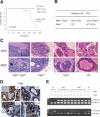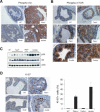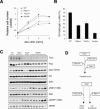Genetic analysis of Pten and Tsc2 functional interactions in the mouse reveals asymmetrical haploinsufficiency in tumor suppression
- PMID: 16027168
- PMCID: PMC1182340
- DOI: 10.1101/gad.1314405
Genetic analysis of Pten and Tsc2 functional interactions in the mouse reveals asymmetrical haploinsufficiency in tumor suppression
Abstract
The role of tumor suppressor haploinsufficiency in oncogenesis is still poorly understood. The PTEN and TSC2 tumor suppressors function to antagonize mTOR (mammalian target of rapamycin) activation by Akt; hence, compound heterozygous inactivation of Pten and Tsc2 in the mouse may in principle exacerbate the tumor phenotypes observed in the single mutants in a reciprocal manner. In contrast, we found that while Tsc2 heterozygosity unmasks Pten haploinsufficiency in growth and tumor suppression, tumorigenesis in Tsc2+/- mutants is surprisingly not accelerated by Pten heterozygosity, even though mTOR activation is cooperatively enhanced by compound Pten/Tsc2 heterozygosity. We show that the wild-type alleles of both Pten and Tsc2 are retained in prostate tumors from both Pten+/- and Pten+/-Tsc2+/- mice, whereas TSC-related tumor lesions are invariably associated with Tsc2 loss of heterozygosity (LOH) in both Tsc2+/- and Pten+/-Tsc2+/- mice. These findings demonstrate that inactivation of TSC2 is epistatic to PTEN in the control of tumor initiation and progression and, importantly, that both Pten and Tsc2 are haploinsufficient for suppression of tumorigenesis initiated by Pten heterozygosity, while neither Pten nor Tsc2 is haploinsufficient for repression of carcinogenesis arising from Tsc2 heterozygosity, providing a rationale for the differential cancer susceptibility of the two human conditions associated with PTEN or TSC2 heterozygous mutations.
Figures





Similar articles
-
Feedback inhibition of Akt signaling limits the growth of tumors lacking Tsc2.Genes Dev. 2005 Aug 1;19(15):1773-8. doi: 10.1101/gad.1314605. Epub 2005 Jul 18. Genes Dev. 2005. PMID: 16027169 Free PMC article.
-
Cooperativity of Nkx3.1 and Pten loss of function in a mouse model of prostate carcinogenesis.Proc Natl Acad Sci U S A. 2002 Mar 5;99(5):2884-9. doi: 10.1073/pnas.042688999. Epub 2002 Feb 19. Proc Natl Acad Sci U S A. 2002. PMID: 11854455 Free PMC article.
-
Crucial role of p53-dependent cellular senescence in suppression of Pten-deficient tumorigenesis.Nature. 2005 Aug 4;436(7051):725-30. doi: 10.1038/nature03918. Nature. 2005. PMID: 16079851 Free PMC article.
-
The role of PTEN in the progression and survival of prostate cancer.Minerva Endocrinol. 2003 Jun;28(2):145-53. Minerva Endocrinol. 2003. PMID: 12717346 Review.
-
The biology and clinical relevance of the PTEN tumor suppressor pathway.J Clin Oncol. 2004 Jul 15;22(14):2954-63. doi: 10.1200/JCO.2004.02.141. J Clin Oncol. 2004. PMID: 15254063 Review.
Cited by
-
Whole-exome sequencing reveals a comprehensive germline mutation landscape and identifies twelve novel predisposition genes in Chinese prostate cancer patients.PLoS Genet. 2022 Sep 12;18(9):e1010373. doi: 10.1371/journal.pgen.1010373. eCollection 2022 Sep. PLoS Genet. 2022. PMID: 36095024 Free PMC article.
-
mTOR and cancer: many loops in one pathway.Curr Opin Cell Biol. 2010 Apr;22(2):169-76. doi: 10.1016/j.ceb.2009.10.007. Epub 2009 Nov 27. Curr Opin Cell Biol. 2010. PMID: 19945836 Free PMC article.
-
The PTEN Conundrum: How to Target PTEN-Deficient Prostate Cancer.Cells. 2020 Oct 22;9(11):2342. doi: 10.3390/cells9112342. Cells. 2020. PMID: 33105713 Free PMC article. Review.
-
Compound haploinsufficiencies of Ebf1 and Runx1 genes impede B cell lineage progression.Proc Natl Acad Sci U S A. 2010 Apr 27;107(17):7869-74. doi: 10.1073/pnas.1003525107. Epub 2010 Apr 12. Proc Natl Acad Sci U S A. 2010. PMID: 20385820 Free PMC article.
-
Tuberous sclerosis complex 1: an epithelial tumor suppressor essential to prevent spontaneous prostate cancer in aged mice.Cancer Res. 2010 Nov 1;70(21):8937-47. doi: 10.1158/0008-5472.CAN-10-1646. Epub 2010 Oct 12. Cancer Res. 2010. PMID: 20940396 Free PMC article.
References
-
- Cairns P., Okami, K., Halachmi, S., Halachmi, N., Esteller, M., Herman, J.G., Jen, J., Isaacs, W.B., Bova, G.S., and Sidransky, D. 1997. Frequent inactivation of PTEN/MMAC1 in primary prostate cancer. Cancer Res. 57: 4997-5000. - PubMed
-
- Di Cristofano A. and Pandolfi, P.P. 2000. The multiple roles of PTEN in tumor suppression. Cell 100: 387-390. - PubMed
-
- Di Cristofano A., Pesce, B., Cordon-Cardo, C., and Pandolfi, P.P. 1998. Pten is essential for embryonic development and tumour suppression. Nat. Genet. 19: 348-355. - PubMed
-
- Di Cristofano A., Kotsi, P., Peng, Y.F., Cordon-Cardo, C., Elkon, K.B., and Pandolfi, P.P. 1999. Impaired Fas response and autoimmunity in Pten+/- mice. Science 285: 2122-2125. - PubMed
Publication types
MeSH terms
Substances
Grants and funding
LinkOut - more resources
Full Text Sources
Medical
Molecular Biology Databases
Research Materials
Miscellaneous
